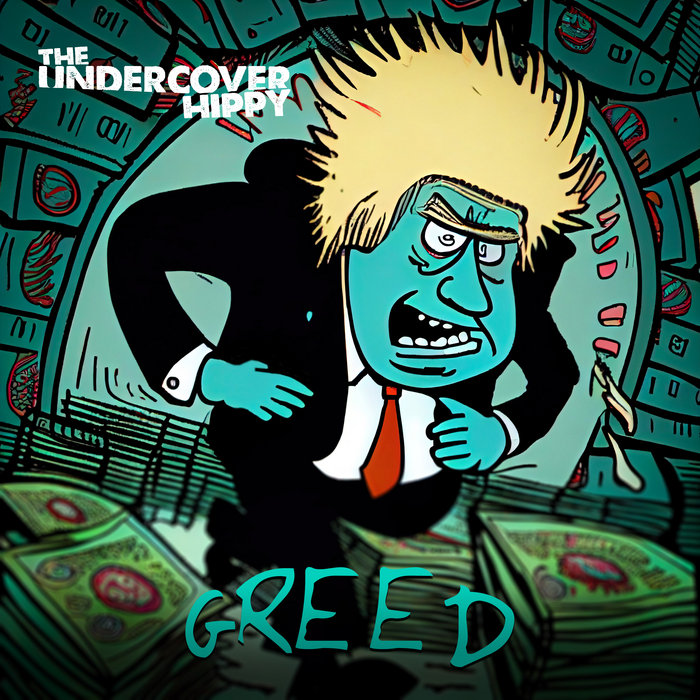
Greed – The Undercover Hippy
this blog is GROOVY – check out great Soul, Funk, Jazz, Hip Hop, Bass, Breaks , Reggae, House n many more TUNES
Hey there, music lovers and rhythm seekers! Today, we’re diving into the funky world where corruption meets creativity. Yup, you guessed it: we’re talking about how shady deals, scandalous behavior, and downright funny incidents have shaped the music scene over the years. So grab your favorite drink, feel the beat, and let’s groove through this wild topic!
From its very beginning, music has always been intertwined with power dynamics. Think back to the days when kings and queens hired musicians to serenade them—sometimes as a way to curry favor or distract from their questionable decisions. But as soon as records started spinning on turntables (and maybe even before), corruption began rearing its head.
One of the most infamous moments in musical history came during the 1950s with something called “payola.” Radio stations were meant to play artists’ songs fairly based on merit—but what happened? Some devious record labels started slipping cash or other perks under the table to get their tunes played more often.
A legendary example was Dick Clark’s American Bandstand! It turned out that certain acts got more airtime because they had some sticky fingers behind them. Just imagine a jingle jitterbugging into your ears while someone behind-the-scenes is waving dollar bills like a magical wand!
Fast forward to rock ’n’ roll—the genre that didn’t just break barriers but also rules! Bands like The Rolling Stones and Led Zeppelin weren’t just known for their iconic sound; they also had pretty notorious reputations off-stage.
Like that time Keith Richards allegedly snorted his father’s ashes mixed with cocaine… now that’s one way to keep family close! Seriously though—these guys were living life large while challenging norms left and right. Their antics blurred lines between genius and chaos—a perfect cocktail for stories teeming with corruption vibes.
Let’s kick it up a notch with some quirky facts about our beloved corruptors-of-music:
The Great Album Cover Conspiracy
Remember Sgt. Pepper’s Lonely Hearts Club Band? Cool album cover right? Well, legend has it Paul McCartney wanted equal prominence among band members—and he ended up putting fake names on vinyl sleeves just so they wouldn’t get too cocky!
Frank Sinatra’s Mafia Connections
Ol’ Blue Eyes himself wasn’t shy when it came down to shady business relationships either! Rumor has it he had connections with organized crime figures like Sam Giancana (who says crime doesn’t pay?). This makes us wonder if “My Way” was actually an ode or somewhat philosophical advice after negotiating gig contracts!
Miley Cyrus vs Twerking Controversy
When Miley took twerking mainstream at an award show several years back—it caused quite an uproar! Who knew shaking one’s hips could lead people toward debating cultural appropriation versus artistic expression? Now that’s some serious backdrop drama… but hey—it made for great memes!
Kanye West’s ‘Taylor Swift Moment’
Ah yes—the infamous stage interruption where Kanye declared Beyoncé deserved an award over Taylor Swift (not particularly corruptive by itself). This little stunt not only caught everyone’s attention but also sparked countless debates over entitlement vs artistry—even inspiring parodies everywhere from Saturday Night Live sketches to TikTok dances!
Vinyl Soundtrack Swaps
In a bizarre twist—some record labels used foreign artists’ albums without consent then claimed success overseas simply due diversified marketing strategies (‘Globalization?’ Nah…).
6.Piracy Movements Gone Wild
Remember Napster? When file-sharing went global cause artists weren’t seeing much return anyway—it stirred controversy galore among creators who were tired of working hard yet kept losing ground financially… Ironically leading many big names towards platforms online today re-building careers higher than ever imagined before streaming took hold (thanks Spotify!).
In recent decades however things have changed significantly thanks partly due technology—but don’t mistake this newfound integrity entirely—as modern-day controversies abound ranging from copyright issues influencing artist payments down road collaborations which are sometimes labeled suspiciously predatory against newcomers trying find footing amidst already established players across genres alike.
Artists still wrestle daily navigating murky waters needing uphold principles yet fend off temptations seducing quick success instead crafting genuine art forms resonating authentically resonates fans globally around clock ticking ever louder beat echoing along burgeoning playlists everywhere 24/7 nonstop….
So what does all this teach us?
At its core—music reflects society; no matter how groovy or grimy things may seem whether orchestrated through harmony discontent respectively amplified emotions resonate deeply human experiences year after year shaping tales told treasure troves rhythms flowing encore keeping truth alive refusing fade away dim lights showcasing vulnerability instead making laughter spark joy midst controversy….. But remember folks — even legends sometimes hit bumpy roads full surprises patchwork shimmer shining brightly coming together creating vibrant histories weaving fresh narratives just waiting unfold…
Rock on dear friends!

Greed – The Undercover Hippy